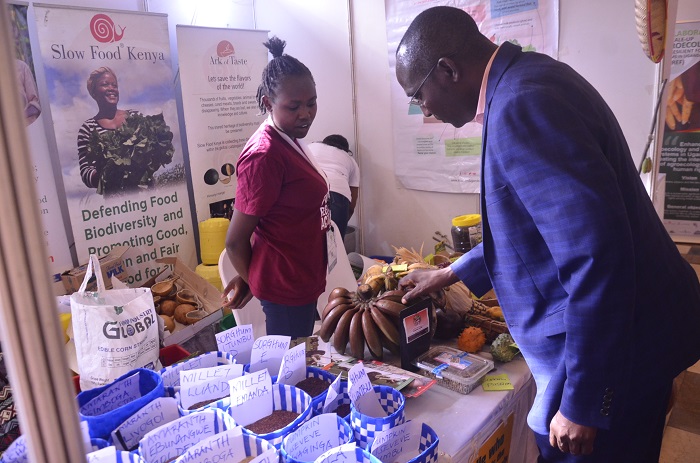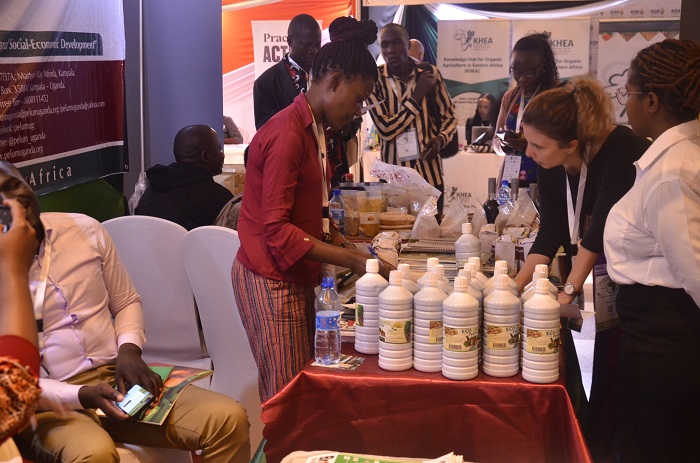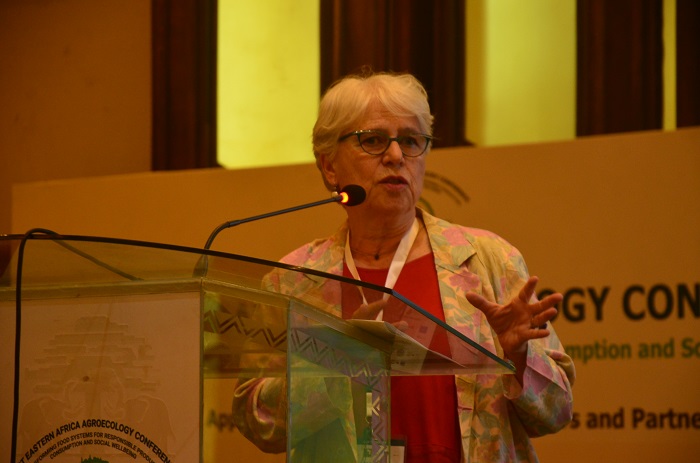By David Okema
NAIROBI, KENYA: The United Nations- Food and Agricultural Organization official in charge of Plant Production and Protection Division (NSP), Dr Emma Siliprandi has called upon stakeholders in agricultural sectors in Subsaharan Africa and the world to be guided by the 10 elements of agroecology in their daily practices.
Dr Siliprandi made the remark at the ongoing 1st East Africa Agroecology Conference taking place in the Kenyan capital, Nairobi. The conference which started on 21st will run up to the 25th March this year. It’s brought participants from West Africa, East Africa, Horn of Africa, Central Africa, Netherlands, India and other parts of the world.
“Let us be guided by the 10 elements and 13 principles of agroecology to understand if we are going in the right direction. For instance, biodiversity, are we advancing biodiversity or destroying it? What about resilience? What about social and cultural values? So, this is why we have these elements and principles to guide us on what we are doing.” Dr Siliprandi said.
The Agricultural Officer-NSP, FAO states that the 10 principles of Agroecology help to guide which direction the world should take to drive the agricultural sector and more so to focus on the social, economic and environmental aspects.
Agroecology refers to sustainable farming that works with nature. It focuses majorly on relationships between plants, animals, people, and their environment – and the balance between these relationships and the practices embraces the application of ecological concepts and principles in farming.
The 10 elements of agroecology that were approved in December 2019 include diversity, co-creation of knowledge, synergies, efficiency, recycling, resilience, human and social values, culture and food traditions, responsible governance, and circular and solidarity economy.
At the conference participants began to raise raging divided opinions on the efficacy of regenerative agriculture (agroecology)if it is to solve Africa’s recurring challenges of food insecurity, malnutrition and adverse climatic events.

It is the responsibility of researchers to create values that can change the attitude and mindset and upscale extension services to the farmers in order to change the food system.
A researcher from Uganda Christian University in Uganda wonders if there are some safeguards in place in practicing agroecology and whether it can bridge the gap between climate change mitigation and adaptation measures in place.
Civil Society wants evidence-based research and data presentation on the successes of agroecology in order for some of them to advocate for it to be mainstreamed in the policy framework if African countries are to achieve the UN sustainable goal 2030 of zero hunger.
“We are asking pertinent questions about how to feed the world. We are just 7 years until the UN sustainable development goal. And the question is; Can Agroecology feed the world? Can it solve the problem of food insecurity, malnutrition, and hunger that are pertinent in sub-Saharan Africa? Claire Atukunda, the programme manager Food Rights Alliance, a civil society based in Uganda asked.
Atukunda says it is tricky in the case of Uganda where there are several policies pertaining to agriculture and these policies tend to contradict themselves. She added that since Agroecology is the holistic approach to food insecurity and sustainable food system it will not easily be incorporated into the practices in Uganda context because the government is prioritizing industrial agriculture and they do not advance agroecology.
“As partners, researchers, and advocates of Agroecology, do we have evidence with context to present to policy makers that it is realistic and can feed the world and improve the livelihood of the farmers because agriculture is the backbone of Africa,” she argues.

In Kenya, Valentine Cherotich, Project manager of Voluntary Services Overseas (VSO) in Kenya says to push agroecology into the national policy framework will take time. However, they are doing a pilot project in Putanga County, in Northern Kenya with the local smallholder farming community and building of actors to push it in the national policies.
Much as many people are disagreeing, the state minister for Agriculture, animal industries and fisheries in Uganda, Fred Bwino Kyakulaga has hoped that agroecology offers an integrated holistic approach to achieving a sustainable food system that addresses problems related to food production in sub-Saharan Africa.
He says Uganda is on the right track to promote agroecology. “Fortunately, Uganda has a comparative advantage to promote agroecology because each agricultural production is by default organic” he stated.
According to Bwino, the conference offers an opportunity to share best practices, research and proven knowledge that can help various stakeholders to formulate policies on implantable values at global, regional and national level.
Looking at Africa in the context of Organic trade where Export of organic agricultural products exceeds domestic consumption, Bert-Jan Ottens, owner and Advisor of ProFound-Advisers in Development, Netherlands, argues the continent need to work hard in transforming their food system instead of wasting time and resources in research, advocacy and policy formulation on things that are vividly doable.
“If you really want to invest in agroecology, you have to invest in water and soil systems. It doesn’t come automatically. And to change the food system, you don’t solve them by research, by policy but by hard work,” Bert-Jan Ottens said.
According to Dr David Amudavi, the Executive Director of Biovision Trust for Africa, the conference is to find an agreeable position to see that all food systems transformation in Eastern Africa is in line with agroecological principles and practices, strengthen network of organizations and initiatives of actors, advance strategies and joint initiatives at institutional level or private sectors and government in term of knowledge generation and dissemination, policy reform, market systems as well as supporting implementation of agroecology-oriented policies by key stakeholders at the regional level.
Do you have a story or an opinion to share? Email us on: dailyexpressug@gmail.com Or follow the Daily Express on X Platform or WhatsApp for the latest updates.
This Story is with the generous support from Eastern and Southern Africa Small Holder Farmers’ Forum (ESAFF) through Agroecology School for Journalists and Communicators.

